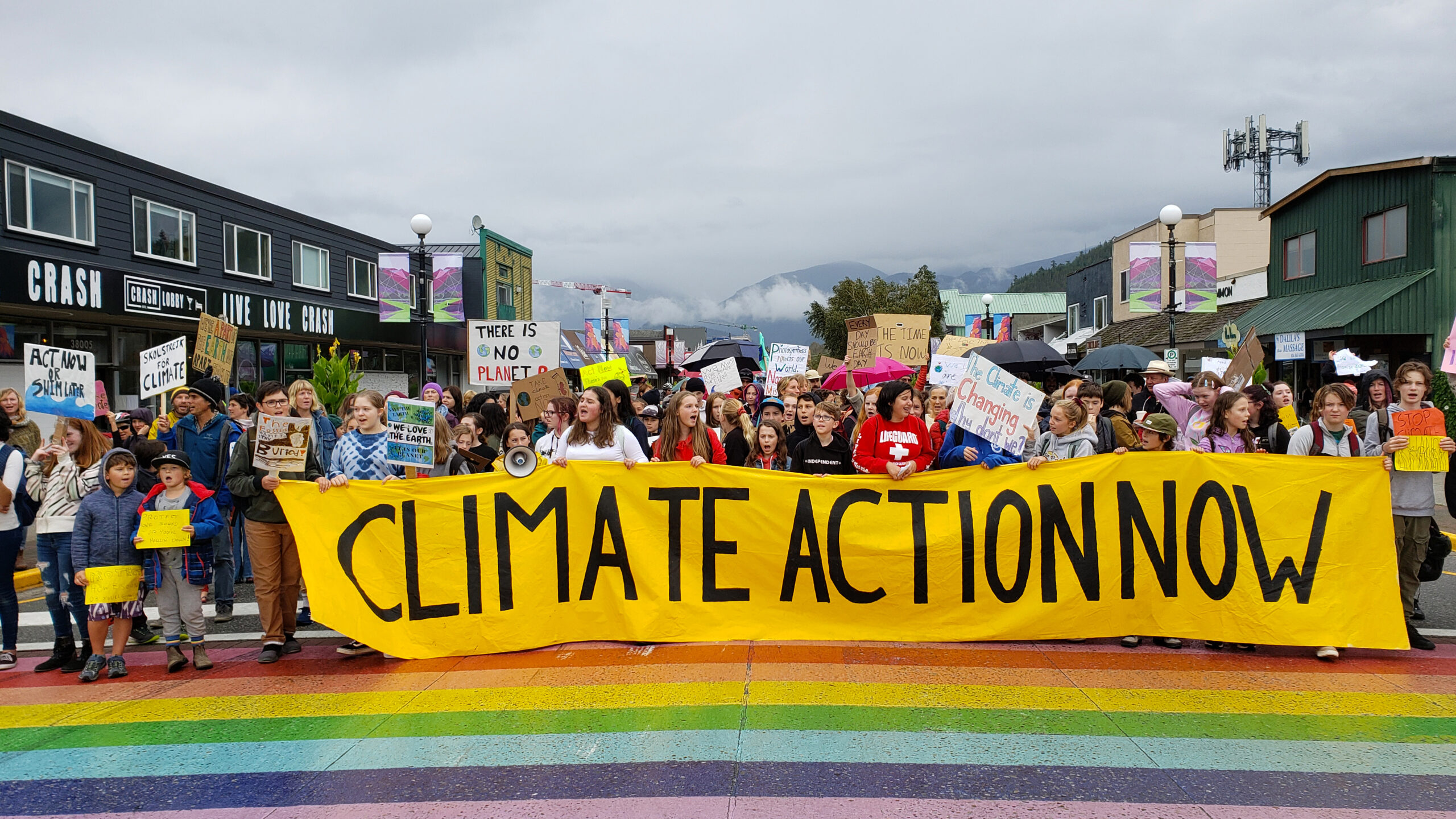
Youth demand climate action at the Global Climate Strike in Squamish, September 2019. Photo: Tracey Saxby
The BC Climate Emergency Campaign has issued a failing grade to the Province for its progress on implementing 10 urgent actions to confront the climate emergency.
The Report Card is based on an open letter that was first published in September 2021, with the support of 200 organizations. One year later, the open letter now has more than 450 organizational signatories, collectively representing over two million British Columbians, or the equivalent of nearly half of the province’s population.
The Report Card calls for Premier-designate David Eby and his administration to prioritize urgent climate action to protect residents of B.C. from the intensifying climate disasters that are already impacting human health and well-being across the province, with a disproportionate impact on Indigenous peoples.
Since the open letter was first published a year ago, B.C. has experienced two atmospheric rivers, severe flooding, and catastrophic landslides; followed by severe drought, wildfires, and low water levels in rivers across the province that have stranded tens of thousands of salmon before they could spawn.
While outlining his agenda last week, Premier-designate Eby said; “We cannot continue to subsidize fossil fuels and expect clean energy to manifest somehow. We cannot continue to expand fossil-fuel infrastructure and hit our climate goals. Our legislated climate targets are of significant importance; targets I want our province to hit.”
The BC Climate Emergency Campaign welcomes these priorities and urges Premier-designate Eby to implement these priorities during his first 100 days in office, and to commit to the other urgent climate actions outlined in the open letter and Report Card.
The 10 urgent climate actions, and their grades, are:
Set binding climate targets based on science and justice – FAIL
Rationale: No plan to achieve the 2025 target, which makes the major gaps and shortcomings in the plan to achieve the 2030 target unacceptable. No plan to achieve the legislated 2040 and 2050 greenhouse gas reduction targets.
Invest in a thriving, regenerative, zero emissions economy – FAIL
Rationale: Did not invest two percent of B.C.’s GDP to advance the zero emissions economy.
Rapidly wind down all fossil fuel production and use – FAIL
Rationale: No plan to rapidly phase out and decommission existing fossil fuel production, use, and exports, coupled with a focus on false solutions that will continue fossil fuel extraction and use, including: blue hydrogen; renewable gas; carbon capture, utilization, and storage (CCUS); carbon offsets; and LNG as a marine fuel.
End fossil fuel subsidies and make polluters pay – PROGRESS
Rationale: B.C. ended the Deep Well Royalty Credit program in 2022, however, new fossil fuel subsidies and incentives to expand fracking were created through B.C.’s Royalty Review.
Leave no one behind – PROGRESS
Rationale: An investment of $134 million to the CleanBC Communities Fund to fund climate action infrastructure projects for Indigenous communities and Local Governments. However, there is no comprehensive plan to support vulnerable communities, including fossil fuel workers, resource-dependent communities, Indigenous or remote communities from the impacts of climate change. The implementation of the Declaration on the Rights of Indigenous Peoples Act is incoherent and inconsistent.
Protect and restore nature – FAIL
Rationale: No plan to protect 30 percent of terrestrial ecosystems by 2030 and limited progress made to conserve terrestrial ecosystems in recent years, and continued logging of old-growth forests and failure to implement deferrals.
Invest in local, organice, regenerative agriculture and food systems – Progress
Rationale: Currently developing a food security policy framework to mitigate climate impacts on food security, and made a commitment to support Indigenous communities in upholding Indigenous food sovereignty in the Climate Preparedness and Adaptation Strategy.
Accelerate the transition to zero emission transportation – Progress
Rationale: CleanBC Roadmap to 2030 committed to reduce distances traveled in light-duty vehicles by 25 percent by 2030, compared to 2020, which is an important, and very ambitious target that sets the standard for other provinces to follow. Accelerated the goal of zero emissions for all new vehicles from 2040 to 2035.
Accelerate the transition to zero emission buildings – FAIL
Rationale: No commitment to end natural gas heating in new buildings until 2030, no plan to eliminate fossil fuel heating by 2035, and no plan to build new affordable zero emissions buildings.
Track and report progress on these actions every year – FAIL
Rationale: The Minister’s annual Climate Change Accountability Report does not comply with its own climate legislation because it fails to explain how B.C.’s climate plans will achieve its 2025, 2040, 2050 targets and the 2030 oil and gas sector target, leaving the public unable to hold B.C. accountable for its progress (or lack of progress) to these targets.
About the BC Climate Emergency Campaign
The BC Climate Emergency Campaign is a group of civil society organizations, anxious about the climate emergency, that are collaborating to increase the ambition of climate policy and action in B.C. We are not a formal coalition, but have chosen to work together on a joint campaign. Signatories of the open letter include agriculture, arts, business, community, education, environment, faith, food producers, health, housing, Indigenous, labour, local government, outdoor recreation, research, seniors, tourism, and youth organizations, bcclimateemergency.ca
Unceded territories of the xʷməθkʷəy̓əm (Musqueam), Sḵwx̱wú7mesh (Squamish) and səlilwətaɬ (Tsleil-waututh) First Nations (Vancouver) | October 27, 2022
